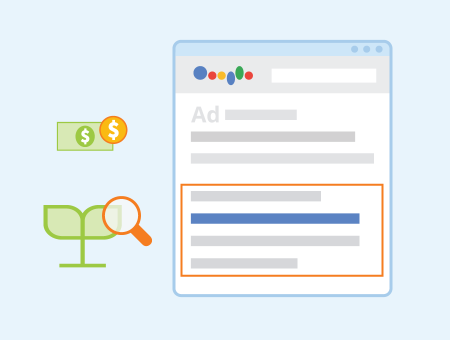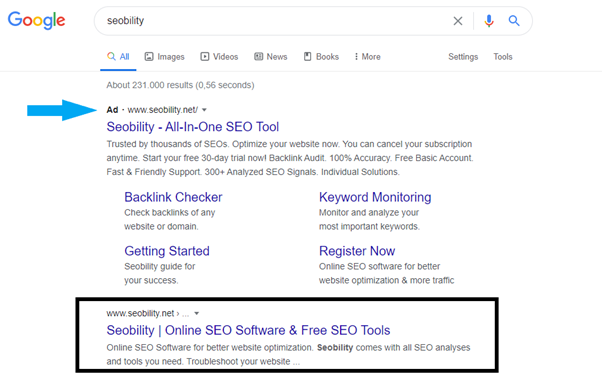Organic Search
Contents
What is organic search?

Organic search refers to the portion of the search engine results page (SERPs) that aren’t marked as ads and have not been paid for by the owner of the website. In marketing, traffic that comes from the organic results is called organic traffic. Paid search results are labeled as ads and are not a part of organic search. Traffic from the paid results is called paid traffic. Paid search and organic search are usually clearly separated by search engines to avoid confusion.
For example, when looking at a Google search results page, you will usually see the top few results labeled as ads. After the ads, there are a number of other results. This section of Google’s SERPs is classed as organic search and contains only organic search results.

An image of the Google search results, with a blue arrow pointing to the paid search section and a black box marking the organic search section.
The difference between organic search and paid search
When looking at a search results page, it’s easy to distinguish between paid search and organic search.
Paid search contains ads which have been bought by the website owner and drive paid traffic to the site. The order in which ads are displayed can depend on various different factors like the amount of money they bid per click, the relevance of the ad, and various other factors depending on what the search engine serving the ads deems important. Paid search results are usually labeled as ads and clearly separated from organic search results.
Organic search is the portion of the search results that have not been paid for by website owners. The website traffic that comes from visitors who clicked organic results is called organic traffic. These organic results are the most relevant webpages according to the search engine’s algorithm, which is the part of the search engine responsible for ordering the search results. This algorithm judges the relevance of pages and orders them from most to least relevant. It does this based on a lot of different factors, called ranking factors. Large search engines don’t allow webmasters to pay for placements in organic search results. This is something Google states clearly on their page explaining the difference between Google ads and Google organic search. [1]
In marketing, both paid traffic and organic traffic can add value to a site and are often combined in a multichannel marketing campaign. The main difference is that when marketing on paid channels, you pay directly for traffic that reaches your site, otherwise called paid media. In organic marketing channels like organic search, traffic isn’t directly paid for but comes from owned channels, otherwise called owned media. Both channels are an important part of most marketing campaigns, but there is a clear distinction to be made between them.
How do Google and other search engines determine the order of organic search results?
Sorting algorithms are used to order search results and provide the most relevant pages to searchers. These algorithms can contain many different factors, including page quality, the website’s reputation, how relevant the content on the page is, the user experience on the page, as well as many others.
The exact factors that Google and other search engines use are generally not shared publicly. However, there are hundreds of selected factors that search engines have chosen to share in the past.
How to find your organic search position
Due to the personalization and localization of SERPs for each specific searcher, it is hard to know in what position your webpage truly ranks in organic search. Here are a few methods used in marketing to determine which position your page ranks:
Incognito search
By searching for your keyword in an incognito browser window you can get a more accurate indication of where your page ranks. This removes cookies and much of the personalization. This is very easy to do but does not always provide the best results due to certain personalization features still being used when in incognito mode.
Free and paid tools
Free tools like Google Search Console can be effective at showing your overall position for a particular keyword. The downside is that information provided is limited.
Besides the tools Google provides, various free and paid tools exist to track the position your page ranks for a particular keyword. These tools can give you more details than the free tools offered by Google and provide results that are not influenced by the individual searcher’s situation. Here at Seobility, we have our own ranking checker you can use for this.
Why it’s important for SEO
SEO is the practice of optimizing your webpages for organic search, which is an important part of most marketing campaigns. Millions of people use search engines every day, which provides a lot of opportunities for companies to reach their target audience and improve the effectiveness of their marketing.
In SEO, you try to optimize your webpages according to the ranking factors. If successful, this helps your page rank higher and drives more traffic to the site, ultimately leading to more leads and increased revenue. Owned media channels like organic search can also be very effective at building trust with your target audience, and can be very cost-effective. All SEO is focused on organic search and driving organic traffic, although many SEOs also offer search engine advertising, which focuses on paid traffic and is part of SEM.
References
- ↑ Google Ads: SEO vs PPC? Google Ads. Retrieved 09 January 2021.
Related links
- https://contentmarketinginstitute.com/2019/10/organic-search/
- https://support.google.com/chrome/answer/7440301
Similar articles
| About the author |
 |